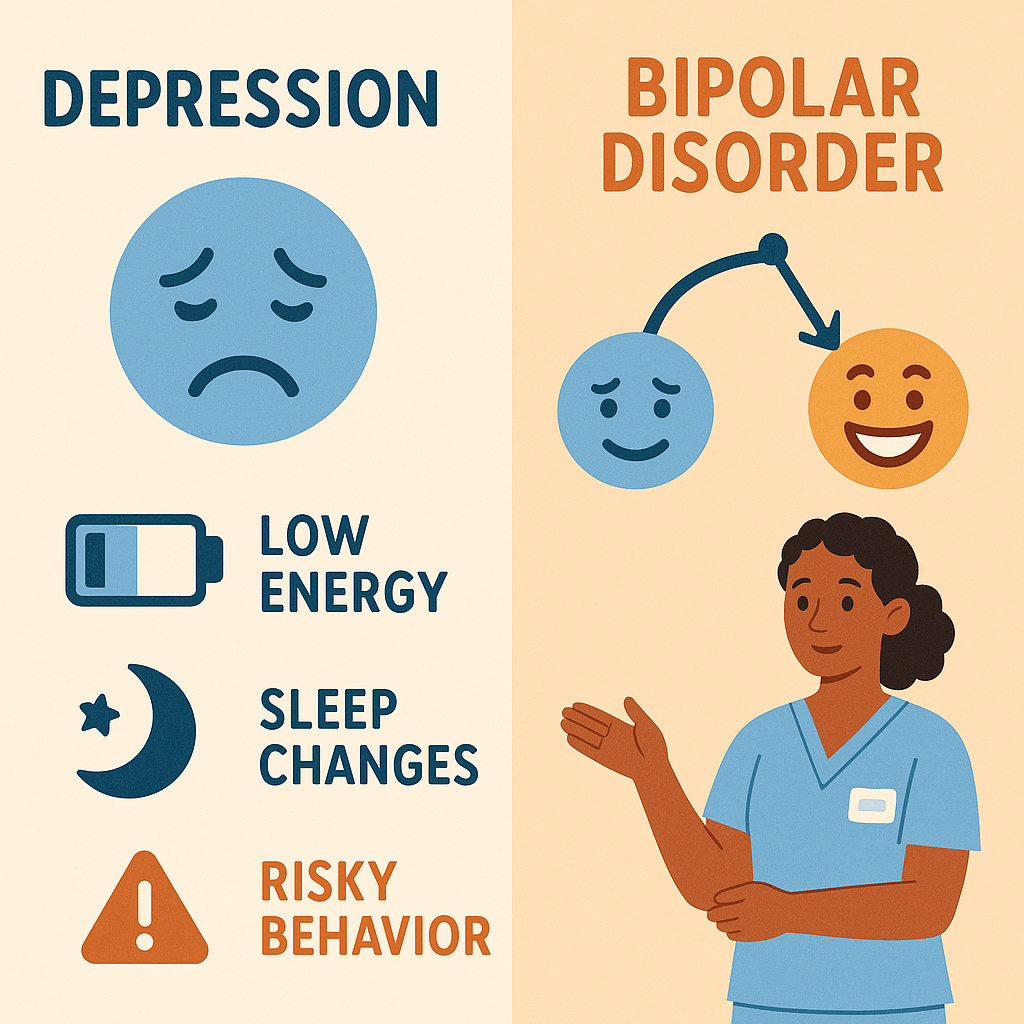Mental health conditions like depression and bipolar disorder can be challenging for any nurse to identify and manage. Whether you’re studying for the NCLEX, practicing as an RN nurse, or reviewing your nursing bundle, knowing the key differences helps you give safe, compassionate care.
Let’s break it down step-by-step so you can spot the signs and know what to do.
🧠 What Is Depression?
Depression (also called major depressive disorder) is one of the most common mental health problems nurses encounter. Patients feel sad, empty, or hopeless most of the day, nearly every day, for at least two weeks.
Key features:
- Persistent low mood
- Loss of interest in activities
- Changes in appetite or weight
- Sleep problems (too much or too little)
- Fatigue, low energy
- Difficulty concentrating
- Thoughts of death or suicide
⚡ What Is Bipolar Disorder?
Bipolar disorder includes episodes of depression plus episodes of mania or hypomania.
Mania means an elevated, expansive, or irritable mood lasting at least one week, with:
- Excessive energy
- Little need for sleep
- Rapid speech
- Risky behaviors (spending sprees, unsafe sex)
- Grandiose ideas
Hypomania is a milder form of mania, lasting at least four days but not severe enough to cause major problems at work or require hospitalization.
🔑 How to Tell the Difference
| Feature | Depression | Bipolar Disorder |
|---|---|---|
| Mood Episodes | Only depression | Depression + mania/hypomania |
| Energy Level | Low | Can swing high (mania) or low (depression) |
| Behavior | Withdrawn, sad | Risk-taking during mania |
| Sleep | Insomnia or oversleeping | Little need for sleep during mania |
| NCLEX Tip | Think persistent sadness | Think mood swings |
Nursing note: Many patients with bipolar disorder are first misdiagnosed with depression. Watch for a history of sudden high-energy periods.
🩺 How Nurses Assess and Document
As an RN nurse, ask patients clear questions:
- “How long have you felt this way?”
- “Do you have periods when you feel unusually high or energetic?”
- “How is your sleep?”
- “Have you done things you normally wouldn’t do?”
Use standard screening tools:
✅ PHQ-9 for depression
✅ Mood Disorder Questionnaire (MDQ) for bipolar disorder
Document:
- Symptoms, duration, and severity
- Patient’s exact words about mood and thoughts
- Safety concerns (suicidal or manic behaviors)
⚕️ Nursing Interventions
Whether it’s depression or bipolar disorder, nurses help keep patients safe and supported:
✅ Monitor for suicidal thoughts — report immediately.
✅ Promote medication adherence — mood stabilizers for bipolar disorder are crucial.
✅ Encourage healthy routines — sleep, nutrition, and daily structure.
✅ Provide emotional support — build trust so patients share how they feel.
🎓 NCLEX & Nursing Bundle Tips
👉 For NCLEX questions:
- Depression = persistent sadness and low energy.
- Bipolar = episodes of high energy (mania/hypomania) plus depression.
- Always choose safety first — report suicidal or manic behaviors that put the patient or others at risk.
Use your nursing bundle practice sheets to quiz yourself on mood disorders and sample care plans.
🗝️ Key Takeaway
Knowing how to tell depression and bipolar disorder apart helps every registered nurse deliver safe, effective mental health care. Stay alert to signs, ask good questions, and advocate for treatment — your patient’s well-being depends on it.

